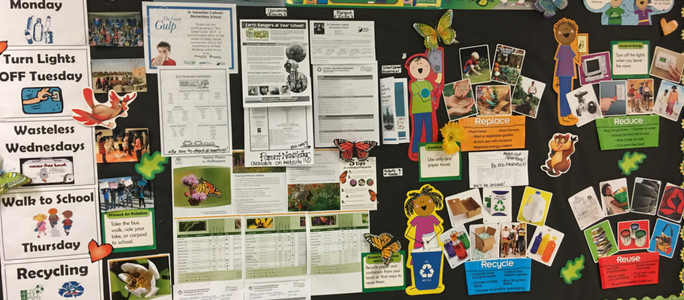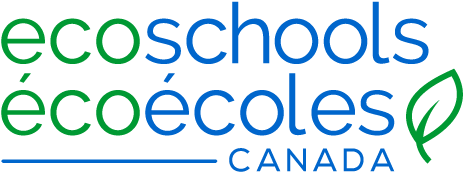
This May, we had the exciting opportunity to visit a record 953 schools across the province and see firsthand all the incredible initiatives and achievements completed in 2017-18.
We are consistently amazed by the range and creativity of projects that are implemented by EcoTeams and their school communities: from newly-minted school gardens, to creating colourful signage and tours for existing ones; from battery and e-waste recycling campaigns to litterless lunches; from active transportation campaigns to organizing spirit-building school assemblies. Each action an EcoSchools takes further encourages their commitment to environmental awareness and protection.
Below is a snapshot of just some of the many successes achieved by EcoSchools this year.
Got a highlight or photo from your school visit? It’s not too late to share – just tag us on Twitter (@ON_EcoSchools), Facebook (Ontario EcoSchools) or Instagram (@on_ecoschools).
What students had to say:
“If we don’t do something now, what will the world look like in 20-30 years? Some people say to always live in the present, but we also have to focus on the future of our environment!” – Luisa, Grade 6, YCDSB
“I have noticed that when we have a clean school ground and school, we all feel better about coming to school everyday.” – Alisha, Grade 8, St. Eugene Catholic Elementary School, HWCDSB
“Je fais partie du club Électricité, mon club préféré. On vérifie si les lumières sont bien fermées.” – Emma, Grade 2, École Élémentaire Charles-Sauriol, CS Viamonde
“I’ve witnessed a huge behaviour shift in staff – their commitment to environmentalism grew exponentially this year because of EcoTeam presentations. The ripple effect of the work done by this team, that came together organically, has been incredible.” – Laurie, EcoTeam Lead, St. Monica, DCDSB
“Being part of the EcoTeam gives me an opportunity to have a voice.” – Student, Franklin Street PS, YRDSB
“Our municipality doesn’t have recycling, so we commit to focusing on waste reduction instead of recycling.” – Tara Balog, Manitouwadge PS, SGDSB
“More people are educated. They know what to do and why. They can then carry that message from school to home.” – Matthew, Grade 8, Regina Mundi, TCDSB
What EcoSchools had to say:
@ON_EcoSchools came to visit @alcdsb_cart today! #enviromentallearning #ecowarriors #ecoschool #goforgold #ALCDSB Thanks for stopping by! pic.twitter.com/FX1sotasht
— Nicole Black (@missblacksclass) May 22, 2018 (St. Carthagh Catholic School, ALCDSB)
Great Job and Well Done! @BernardEcoTeam Student Tour Guide Leaders welcomed Paula and Raysha from @ON_EcoSchools and @TRCA_Edu today with poise and passion! Everyone is very proud of you all. Huge thanks to @StBernardDPCDSB for their support in helping this day come together! pic.twitter.com/pfLHsFbvlc
— St. Bernard ECO Team #BernardSTEM (@BernardEcoTeam) May 28, 2018 (St. Bernard of Clairvaux, DPCDSB)
Congrats to @OLVMWolverines Ecoteam for an awesome job today with @ON_EcoSchools. What a lot of great work and what a great group of reps! #hcdsb @MelanieKuchta1 pic.twitter.com/0nXNmGOK3H
— Melissa Carnelos (@MelissaCarnelos) May 22, 2018 (Our Lady of Victory Catholic Elementary School, HCDSB)
Our Eco team leaders sharing @MasseyStreet_PS’ journey for our @ON_EcoSchools certification. Way to go @high5MASSEY @boyce_niki ! pic.twitter.com/UpvtQ7Lj7a
— Kathy (@kozovski_kathy) May 18, 2018 (Massey Street Public School, PDSB)
Our Eco Team did an amazing job sharing all of the great things we are doing to maintain our Gold EcoSchool status. Thanks to Dr. Korbel, Mrs. Mitchell and the team. Thanks also to Anita from @ON_EcoSchools for joining us!! @WCDSBNewswire @WCDSBGreen pic.twitter.com/JDGX5ELpZP
— Holy Rosary CES (@HRosaryWaterloo) May 16, 2018 (Holy Rosary Catholic Elementary School, WCDSB)
What our assessors had to say:
Thank you to @GEDSB and @bhncdsb Eco-Schools for lots of great memories from 2018 school tours. Student and staff passion for the health and wellbeing of the environment is evident. #Ecoschools2018 #EcoGEDSB @ON_EcoSchools pic.twitter.com/BFbWONiaH8
— Neil Dunning (@neil_dunning) May 22, 2018
Learning about all things green from a proud @CSViamonde EcoTeam! @ON_EcoSchools #schoolgarden #gogreen pic.twitter.com/tjs9xFZkeY
— Lindsay Bunce (@lindsaybunce) May 22, 2018
@ON_EcoSchools assessor Paula loving the School Ground Greening projects at Cawthra Park Seconday School! pic.twitter.com/a8FcH3Blss
— TRCA Education (@TRCA_Edu) May 16, 2018
What school boards had to say:
We have a strong Eco presence in our @YRDSB FSL programs & schools. Tres bien!! Fabulous school visit today @ON_EcoSchools pic.twitter.com/jpU03sdfSb
— YRDSB EcoSchools (@YRDSBEcoSchools) May 28, 2018
@eec_saintemarie il est évident qu’on se soucie de l’écologie. Les projets d’élèves sont sur tous les murs. @ON_EcoSchools #cecce pic.twitter.com/xjrBzQglJf
— Roxanne Coupal (@CoupalR) May 18, 2018
Thanks @MotherTeresaHS for an awesome @ON_EcoSchools visit this morning! Loved hearing about your #StopSucking campaign, your aquaponics system, your all vegan bake sale, the plans for your new outdoor classroom & your passion for sustainable agriculture! #ocsbEco pic.twitter.com/Cic7ny3cOS
— OCSB EcoSchools (@OCSBeco) May 17, 2018
Creative EcoSchools examples:
Here are just some of the creative environmental actions we saw when we visited schools across the province.
- At David Suzuki Secondary School (PDSB), the Tree Specimen ID Sheet was an introductory photography assignment where students focused on getting good photos of the tree species around the school property and making an info sheet in Photoshop (this project had a 3-4 week duration). They learned basic camera and Photoshop skills, but also lessons on parts of the tree, how to ID trees and leaves, how tree species are named, what cultivars are, what invasive species are, and why certain trees were planted in the park next door. The ID sheets were displayed in the school for everyone to see.
- St. Mary’s (LCDSB) borrowed a bicycle blender from the Health Unit. It came with an information kit discussing the amount of sugar in pre-made drinks. The students then made smoothies by choosing healthy ingredients, like spinach grown in their hydroponic growing towers. They then used pedal power to spin the blender and make smoothies. Every student in the school was able to experience this eco-friendly smoothie and was able to discuss healthy foods and energy conservation.
- The Green Squad at St. Gabriel (OCSB) set up an Eco Fair in an empty portable to display and share all of the projects they’ve been working on throughout the year, from vermicomposting, to monitoring energy consumption, bird feeder making, seed planting, and more.
- Holy Trinity Catholic High School (CDSBEO) has started a permaculture farm as part of their SHSM agriculture. Their aim is to provide food for the cafeteria, start a CSA, and then sell produce on the roadside at a farm stand. They have a whopping four acres committed to the project!
- St. Francis French Immersion CA (HSCDSB) is a small school in Sault St Marie, ON that certified for the first time at a Silver level! One of their projects involved asking students to donate old stuffed toys to be outfitted with student-sewn squeakers that were then donated to the Humane Society.
- Students from Brooklin High School (DDSB), the school board, and a conservation authority are working together to create an interpretive nature trail with native and pollinator-friendly plants in their community.

Recent Comments